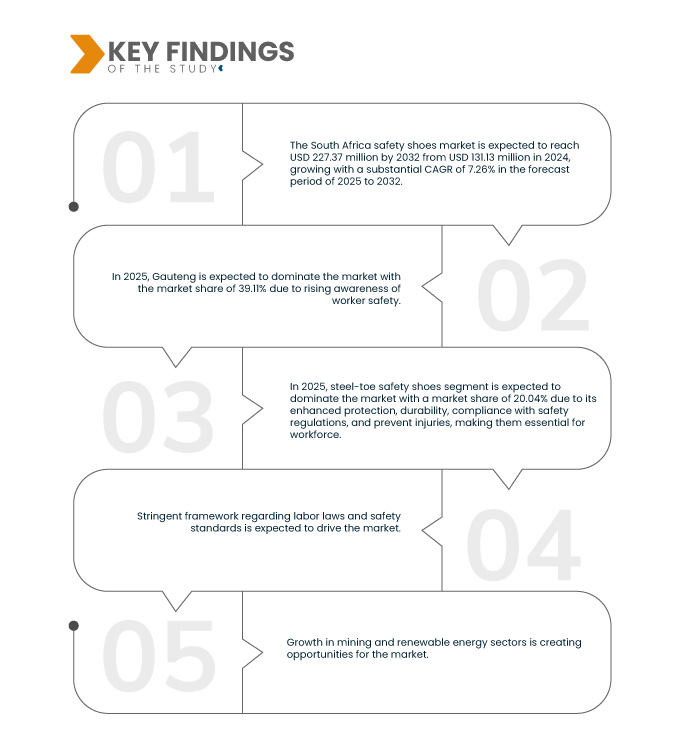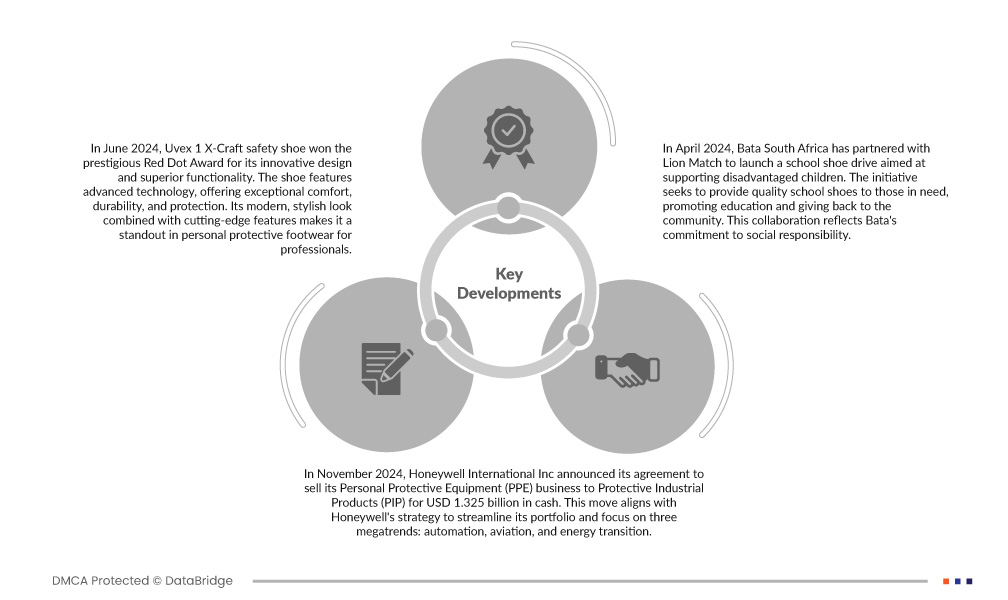L'expansion de secteurs tels que l'industrie manufacturière et la construction en Afrique du Sud stimule considérablement la demande de chaussures de sécurité . Ces deux secteurs présentent par nature des risques élevés, les travailleurs étant exposés à des dangers potentiels tels que la chute d'objets, de matériaux tranchants, de machines lourdes et de surfaces glissantes. Par conséquent, les chaussures de sécurité sont devenues essentielles pour assurer la protection des travailleurs et le respect des réglementations strictes en matière de santé et de sécurité au travail.
Dans le secteur manufacturier, la croissance rapide et les avancées technologiques ont entraîné une augmentation de la main-d'œuvre et une demande accrue d'équipements de protection individuelle (EPI), notamment de chaussures de sécurité. Les travailleurs des usines, notamment ceux qui utilisent des machines lourdes ou manipulent des matières premières, sont très vulnérables aux blessures aux pieds. Par conséquent, il existe un besoin croissant de chaussures offrant des caractéristiques telles qu'une coque en acier, des semelles anti-perforation et antidérapantes pour réduire les blessures et les accidents. Avec la multiplication des usines et des unités de production en Afrique du Sud, la demande de chaussures de sécurité continue de croître. De même, le secteur de la construction en Afrique du Sud contribue largement à cette demande croissante de chaussures de sécurité. Figurant parmi les secteurs les plus importants de l'économie, la construction implique des environnements de travail physiquement exigeants et dangereux, où les travailleurs sont exposés aux risques liés aux débris, au levage de charges lourdes et aux équipements. Des bottes de sécurité offrant un maintien de la cheville, un amorti et une protection contre les risques électriques sont essentielles pour atténuer ces risques. Avec l'essor du secteur de la construction, stimulé par les projets d'infrastructures, l'urbanisation et le développement commercial, le besoin de chaussures de sécurité fiables augmente.
L'expansion de ces deux secteurs reflète une plus grande sensibilisation à la sécurité au travail et à l'importance de réduire les taux d'accidents. Cela entraîne une demande accrue de chaussures de sécurité spécialisées conçues pour répondre à ces défis. Cette demande croissante devrait se poursuivre avec le développement des secteurs industriels sud-africains.
Accéder au rapport complet sur https://www.databridgemarketresearch.com/reports/south-africa-safety-shoes-market
L'étude de marché de Data Bridge analyse que le marché sud-africain des chaussures de sécurité devrait atteindre 227,37 millions USD d'ici 2032, contre 131,13 millions USD en 2024, avec un TCAC substantiel de 7,26 % au cours de la période de prévision de 2025 à 2032.
Principales conclusions de l'étude
Cadre strict concernant les lois du travail et les normes de sécurité
L'Afrique du Sud a mis en place un cadre rigoureux en matière de législation du travail et de normes de sécurité, ce qui joue un rôle essentiel dans la stimulation de la demande de chaussures de sécurité dans des secteurs tels que l'industrie manufacturière, la construction et l'exploitation minière. Le cadre réglementaire du pays met l'accent sur la protection des travailleurs et fixe des normes élevées en matière de sécurité au travail, garantissant ainsi le respect par les entreprises des réglementations visant à minimiser les accidents et les décès au travail.
La loi sud-africaine sur la santé et la sécurité au travail (OHSA) impose aux employeurs de fournir un environnement de travail sûr, notamment en fournissant des équipements de protection individuelle (EPI) appropriés à leurs employés. Les chaussures de sécurité sont un élément clé de ces EPI, notamment dans les environnements de travail dangereux où les travailleurs sont exposés à des risques tels que la chute d'objets, les risques électriques et l'exposition à des matériaux tranchants ou lourds. La loi exige que les employeurs veillent à ce que leurs employés portent des chaussures de sécurité adaptées afin de prévenir les blessures, telles que les fractures ou les perforations, qui pourraient résulter d'accidents dans des secteurs comme la construction et l'industrie manufacturière.
De plus, les normes de sécurité sud-africaines sont alignées sur les meilleures pratiques internationales, garantissant que les chaussures de sécurité répondent à des critères de qualité spécifiques. Ces caractéristiques incluent des embouts de protection en acier, des semelles anti-perforation, des propriétés antidérapantes et une résistance aux risques électriques. Le respect de ces normes réduit non seulement les risques d'accidents du travail, mais permet également aux entreprises d'éviter les sanctions et les conséquences juridiques liées au non-respect de ces normes.
Outre le droit du travail, la sensibilisation croissante des employeurs et des travailleurs à la sécurité au travail a conduit à une attention accrue portée aux chaussures de sécurité. Les entreprises investissent de plus en plus dans des chaussures de sécurité de haute qualité, offrant confort et durabilité, tout en respectant les exigences légales. Cela a entraîné une demande croissante de chaussures de sécurité en Afrique du Sud, motivée à la fois par les obligations légales et par l'engagement à préserver le bien-être des travailleurs dans les environnements à haut risque.
Portée du rapport et segmentation du marché
Rapport métrique
|
Détails
|
Période de prévision
|
2025 à 2032
|
Année de base
|
2024
|
Années historiques
|
2018-2023 (personnalisable jusqu'à 2013-2017)
|
Unités quantitatives
|
Chiffre d'affaires en millions USD
|
Segments couverts
|
Produit (chaussures de sécurité à embout d'acier, chaussures à embout composite, protège-métatarses, chaussures antidérapantes, chaussures de sécurité industrielles, chaussures résistantes aux produits chimiques, chaussures classées contre les risques électriques (EH), bottes de sécurité résistantes à la chaleur, bottes de travail légères, bottes en caoutchouc/en PVC, chaussures de sécurité à embout en fibre et chaussures de sécurité sportives), matériau de la chaussure (cuir, caoutchouc, plastique et autres), matériau de la semelle (caoutchouc et plastique), canal de distribution (B2B et B2C), sexe (hommes et femmes), secteur d'activité (exploitation minière, pétrole et gaz, construction/génie civil, agriculture, transport, chimie , métallurgie, pharmacie , alimentation et boissons, électronique, bricolage au détail et sécurité/services publics)
|
Province couverte
|
Gauteng, Kwazulu-Natal, Cap-Occidental, Cap-Oriental, Limpopo, Mpumalanga, Nord-Ouest, État libre et Cap-Nord
|
Acteurs du marché couverts
|
Kaliber Footwear (Afrique du Sud), Honeywell International Inc (États-Unis), BBF Safety Group (Afrique du Sud), SHEQ SAFETY (Afrique du Sud), Neptun Boot (Afrique du Sud), Bata Industrials (Afrique du Sud), Claw Boots International (Afrique du Sud), uvex group (Allemagne) et JCB Workwear (Royaume-Uni) entre autres
|
Points de données couverts dans le rapport
|
Outre les informations sur les scénarios de marché tels que la valeur marchande, le taux de croissance, la segmentation, la couverture géographique et les principaux acteurs, les rapports de marché organisés par Data Bridge Market Research comprennent également une analyse approfondie des experts, une analyse des prix, une analyse de la part de marque, une enquête auprès des consommateurs, une analyse démographique, une analyse de la chaîne d'approvisionnement, une analyse de la chaîne de valeur, un aperçu des matières premières/consommables, des critères de sélection des fournisseurs, une analyse PESTLE, une analyse Porter et un cadre réglementaire.
|
Analyse des segments
Le marché sud-africain des chaussures de sécurité est segmenté en six segments notables en fonction du produit, du matériau de la chaussure, du matériau de la semelle, du canal de distribution, du sexe et de l'industrie.
- Sur la base du produit, le marché est segmenté en chaussures de sécurité à embout d'acier, chaussures à embout composite, protections métatarsiennes, chaussures antidérapantes, chaussures de sécurité industrielles, chaussures résistantes aux produits chimiques, chaussures classées contre les risques électriques (EH), bottes de sécurité résistantes à la chaleur, bottes de travail légères, bottes en caoutchouc/bottes en PVC/bottes en caoutchouc, chaussures de sécurité à embout en fibre et chaussures de sécurité sportives.
En 2025, le segment des chaussures de sécurité à embout d'acier devrait dominer le marché des chaussures de sécurité en Afrique du Sud.
En 2025, le segment des chaussures de sécurité à embout d'acier devrait dominer le marché avec une part de marché de 20,04 % grâce à leur fiabilité, leur puissance et leur rentabilité. Offrant une protection renforcée, une durabilité accrue, le respect des réglementations de sécurité et la prévention des blessures, ces chaussures sont essentielles pour les travailleurs.
- Sur la base du matériau de la chaussure, le marché est segmenté en cuir, caoutchouc, plastique et autres
En 2025, le segment du cuir devrait dominer le marché des chaussures de sécurité en Afrique du Sud
En 2025, le cuir devrait dominer le marché avec une part de marché de 40,96 % grâce à son rôle essentiel dans les grands projets aérospatiaux et de défense. Il offre durabilité, confort, respirabilité et imperméabilité, ce qui le rend idéal pour les chaussures de sécurité en conditions difficiles.
- En fonction du matériau de la semelle, le marché est segmenté en caoutchouc et en plastique. En 2025, le caoutchouc devrait dominer le marché avec une part de marché de 60,39 % grâce à ses propriétés antidérapantes, sa durabilité, sa flexibilité et son imperméabilité, améliorant ainsi la sécurité et le confort des travailleurs dans des environnements exigeants.
- Selon les canaux de distribution, le marché est segmenté en B2B et B2C. En 2025, le segment B2B devrait dominer le marché avec une part de marché de 63,12 %.
- Le marché est segmenté en fonction du genre. En 2025, les hommes devraient dominer le marché avec une part de marché de 79,02 %.
- Le marché est segmenté par secteur d'activité : mines, pétrole et gaz, construction et génie civil, agriculture, transports, chimie, métallurgie, pharmacie, agroalimentaire, électronique, commerce de détail et bricolage, et sécurité et services publics. En 2025, le secteur minier devrait dominer le marché avec une part de marché de 27,09 %.
Acteurs majeurs
Data Bridge Market Research analyse BBF Safety Group (Afrique du Sud), Bata Industrials (Afrique du Sud), Honeywell International Inc (États-Unis), Kaliber Footwear (Afrique du Sud) et Claw Boots International (Afrique du Sud), entre autres, comme les principaux acteurs du marché opérant sur le marché.
Évolution du marché
- En juin 2024, la chaussure de sécurité Uvex 1 X-Craft, produite par le groupe uvex, a remporté le prestigieux Red Dot Award pour son design innovant et sa fonctionnalité supérieure. Dotée d'une technologie de pointe, cette chaussure offre un confort, une durabilité et une protection exceptionnels. Son look moderne et élégant, associé à des fonctionnalités de pointe, en fait une chaussure de protection individuelle de premier ordre pour les professionnels.
- En novembre 2024, Honeywell International Inc. a annoncé la cession de son activité d'équipements de protection individuelle (EPI) à Protective Industrial Products (PIP) pour 1,325 milliard de dollars US en numéraire. Cette opération s'inscrit dans la stratégie d'Honeywell visant à rationaliser son portefeuille et à se concentrer sur trois grandes tendances : l'automatisation, l'aviation et la transition énergétique. Cette cession s'inscrit dans la stratégie plus large d'Honeywell visant à céder ses activités non stratégiques tout en renforçant ses secteurs d'activité clés. La transaction, qui concerne 20 sites de production et 17 centres de distribution dans le monde, devrait être finalisée au premier semestre 2025.
- En avril 2023, Bata Afrique du Sud s'est associée à Lion Match pour lancer une collecte de chaussures scolaires afin de soutenir les enfants défavorisés. Cette initiative vise à fournir des chaussures scolaires de qualité aux personnes dans le besoin, à promouvoir l'éducation et à contribuer à la communauté. Cette collaboration reflète l'engagement de Bata en matière de responsabilité sociale.
- En août 2022, Bata Afrique du Sud a reçu un prix spécial pour sa réaction rapide et efficace à la protection de son usine lors du pillage du KwaZulu-Natal. L'engagement de l'entreprise à protéger ses employés, ses produits et ses installations pendant la crise a mis en lumière sa résilience et son engagement envers la communauté locale.
Selon l'analyse de Data Bridge Market Research :
Pour plus d'informations sur le marché des chaussures de sécurité en Afrique du Sud, cliquez ici : https://www.databridgemarketresearch.com/reports/south-africa-safety-shoes-market













